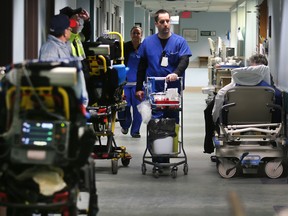
While the federal and provincial governments squabble over health care funding, Canadians are facing the longest medical wait times for treatment ever recorded.
A new study by the Fraser Institute which has tracked this data since 1993, reports that the median wait time for treatment in Canada this year across 12 medical specialties was 27.4 weeks, surpassing last year’s 25.6 weeks and 195% higher than 9.3 weeks in 1993.
As the Canadian national soccer teams head to their respective FIFA World Cups, Derek Van Diest is on the scene to cover all the action. Expect expert insights and analysis in your inbox daily throughout the tournaments, and weekly on Thursdays for the rest of the season.
Thanks for signing up!
A welcome email is on its way. If you don't see it, please check your junk folder.
The next issue of Corner Kicks with Derek Van Diest will soon be in your inbox.
Medical wait times are defined as the time it takes for the referral of a patient by a general practitioner to the start of treatment by a specialist for medically-necessary elective care.
Elective treatment does not mean these procedures are minor, optional, unimportant or can be delayed indefinitely.
It simply means they are scheduled in advance — everything from heart and brain surgery to treatment for cancer — as opposed to emergency care.
As the study notes, “research has repeatedly shown that wait times for medically necessary treatment are not benign inconveniences” and can lead to increased pain, suffering and mental anguish, lower the chances of full recovery and in the most severe cases result in permanent disability and death.
“Crucially, physicians report that their patients are waiting over six weeks longer for treatment (after seeing a specialist) than what they consider to be clinically reasonable.”
Bacchus Barua, co-author of the study, “Waiting Your Turn: Wait Times for Health Care in Canada, 2022” said while the impact of COVID-19 on Canada’s health care system has been a contributing factor in lengthening wait times, it’s not the root cause.
“Previous results revealed that patients waited an estimated 20.9 weeks for medically necessary elective care in 2019 — long before the pandemic started,” he said.
A Fraser Institute study in 2020 found that Canada has the longest medical wait times of 10 comparable industrialized countries with universal health care systems who are members of the Organization for Economic Co-operation and Development and track comparable data.
“Excessively long wait times remain a defining characteristic of Canada’s health care system,” said study co-author Mackenzie Moir.
This year, the shortest median wait time was in Ontario at 20.3 weeks while the longest was in P.E.I. at 64.7 weeks.
Median wait times in the other provinces were, in ascending order, 25.8 weeks in B.C.; 29.4 weeks in Quebec; 30.1 weeks in Saskatchewan; 32.1 weeks in Newfoundland and Labrador; 33.3 weeks in Alberta; 41.3 weeks in Manitoba; 43.3 weeks in New Brunswick and 58.2 weeks in Nova Scotia.
Wait times went up in every province compared to last year except for B.C. and Saskatchewan where they declined slightly.
Median wait times nationally were longest for neurosurgical (brain) procedures at 58.9 weeks, shortest for radiation treatments at 3.9 weeks.
Canadians waiting for diagnostic procedures faced a median wait time of 4.9 weeks for ultrasounds, 5.4 weeks for CT scans and 10.6 weeks for MRIs.
-

Flu surges on heels of RSV, COVID-19 to overwhelm children’s hospitals in Canada
-

Ottawa calls for project proposals that help internationally trained health workers
The study estimates that nationally, Canadians are waiting for 1.2 million medical procedures this year, down slightly from 1.4 million in 2021.
The data for the study was supplied by 975 doctors across the country surveyed from Jan. 10 to Sept. 15.
While the findings are consistent with previous Fraser Institute studies on medical wait times, the authors note that because the survey covered an extended period of time and the response rate was lower than in previous years, the findings should be interpreted with some caution.


